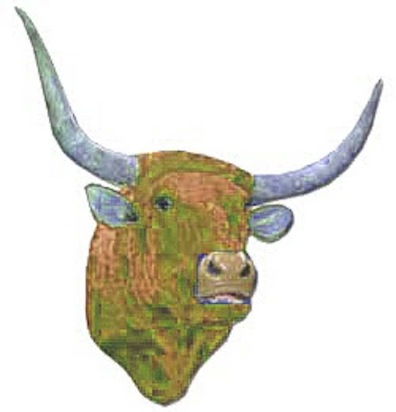In Telemachus Mulligan tells Stephen, "You put your
hoof in it now," and as he sets off carrying Deasy's FMD
letter at the end of Nestor Stephen thinks that
"Mulligan will dub me a new name: the bullockbefriending
bard." From these details it would seem that, in addition to
nicknaming Stephen "Kinch" and caustically calling
him a "jesuit,"
Mulligan has for some reason decided to think of his friend as
bovine. But the mythology originated with Joyce, and he did
not merely peg it to his persona as an external symbolic
accoutrement. Stephen has learned to think of himself in
relation to cattle in A Portrait of the Artist as a Young
Man, and those habits persist in Ulysses.
Gifted by his creator with a strange surname, Stephen thinks
of himself in Portrait as a
Daedalus-to-be: "Old father, old artificer, stand me now and
ever in good stead." Before Daedalus made wings to fly away
from Crete, he crafted an artificial cow
inside which Pasiphae could satisfy her lustful desire for a
prize bull. Stephen recalls this unsavory past in Circe:
"Remember Pasiphae for whose lust my grandoldgrossfather
made the first confessionbox." The name Stephen, which
means "wreath," also evokes the garlands which prepared bulls
for sacrificial slaughter in ancient Greece. The passive
verb stephanomai carried the meaning “to be prepared
for sacrifice.”
From its first sentence Joyce's Portrait associates
Stephen with cattle: "Once upon a time and a very good time it
was there was a moocow coming down along the road and this
moocow that was coming down along the road met a nicens little
boy named baby tuckoo...." As a boy of six years, he is drawn
to the beauty of cows in a pasture but revolted by their
winter quarters: "the first sight of the filthy cowyard at
Stradbrook with its foul green puddles and clots of liquid
dung and steaming bran troughs, sickened Stephen’s heart." But
when he rides on the milk car "these chilly drives blew away
his memory of the filth of the cowyard and he felt no
repugnance at seeing the cow hairs and hayseeds on the
milkman’s coat." Later, at Belvedere, some fellow students
call him by the Greek name for oxen: "—Come along, Dedalus!
Bous Stephanoumenos! Bous Stephaneforos!… —Stephanos Dedalos!
Bous Stephanoumenos! Bous Stephaneforos!" Stephen recalls this
nickname in Oxen of the Sun: "I, Bous
Stephanoumenos, bullockbefriending bard."
"Bullockbefriending" adds a puzzling detail to Stephen's
association with cattle. In a personal communication David
Heinimann reminds me that a bullock is a steer––i.e.,
castrated. Stephen would surely be aware of this distinction
implicit in his choice of words. In Telemachus he has
reacted to Mulligan's promise to give Haines a "ragging"––a
schoolboy hazing—by imagining the victim's terror: "With slit
ribbons of his shirt whipping the air he hops and hobbles
round the table, with trousers down at heels, chased by Ades
of Magdalen with the tailor's shears. A scared calf's face
gilded with marmalade. I don't want to be debagged! Don't you
play the giddy ox with me!" Debagging refers simply to pulling
down a boy's trousers, but the tailor's "shears," the "slit"
shirt, and the "bag" between the boy's legs evoke
castration, and putting a "calf's face" on him
(amplified by the mention of an "ox") links this
cutting with cattle. The thought prompts kindness toward
Haines: "— Let him stay, Stephen said. There's nothing
wrong with him except at night."
It may be that the thought of bulls' throats being slit,
obscurely lodged in Stephen's Christian name, lies behind his
fantasy of bovine castration, and that this fantasy which
makes him unexpectedly befriend Haines in Telemachus
suggests "bullockbefriending" in Nestor. If Stephen is
indeed thinking along these lines, then his feeling of
solidarity with cattle coheres with his self-identification as
a stag "bayed
about" by hounds in Proteus. Joyce, a pacifist
who thought of himself as a solitary striver menaced by the
rabble, had tried out the deer image in two works in 1904: the
poem The Holy Office and the essay A Portrait of
the Artist. It suited his conception of himself as a
sacrificial victim comparable to Charles Stewart Parnell and
Jesus Christ. In Ulysses he apparently added bulls to
the mix.
As far as I know Joyce did not think of himself as an ox, but
there is good reason to suppose that he harbored creaturely
sympathies with cattle. Like Stephen, he responded to an acquaintance's concern
about foot and mouth disease by helping to place a letter on
the subject in an Irish newspaper, so one may imagine that he
took some jocoserious
interest in the fool's errand on which Mr. Deasy sends
Stephen.
Stephen's fancy of a "bullockbefriending bard" may also sound
intertextual notes. Gifford observes that Homer "befriended"
the cattle of the god Helios by condemning the Greeks who
slaughtered them—and Homer was certainly the "bard"
most important to Joyce's project of writing an epic in modern
times. Aquinas, another writer who was supremely important to
Joyce (and Stephen), was called "the dumb ox" by his fellow
students at the university in Cologne. Gifford quotes a remark
attributed to his teacher, Albertus Magnus: "We call him the
dumb ox, but he will one day give such a bellow as shall be
heard from one end of the world to the other."
